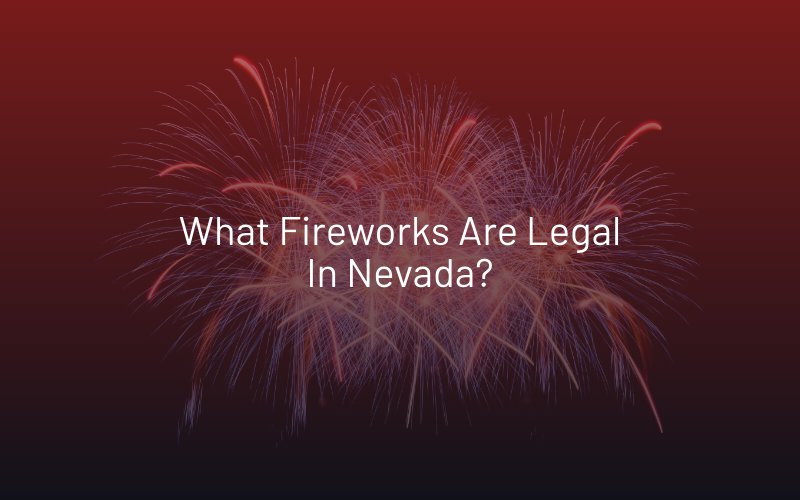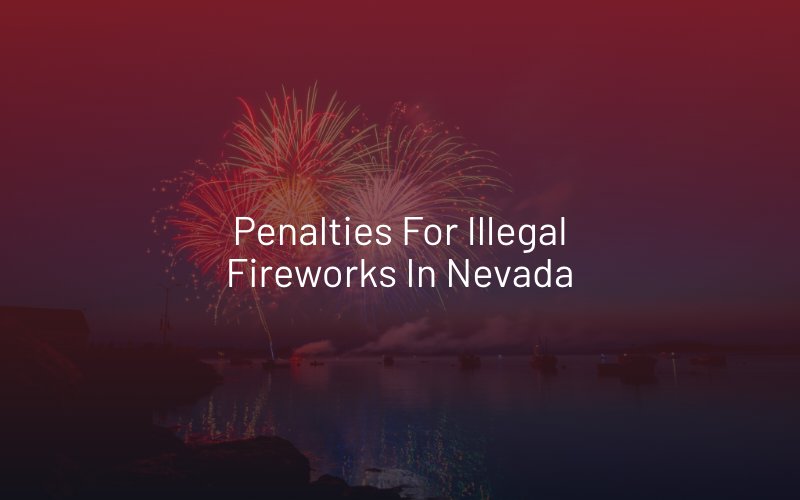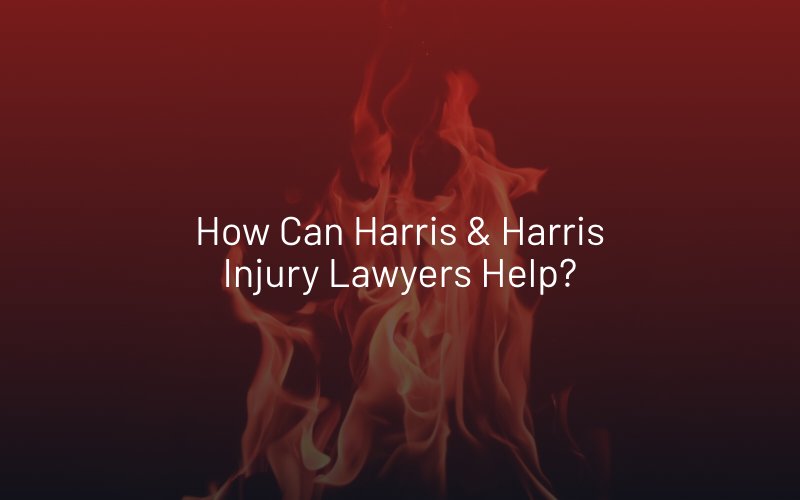Nevada Firework Laws Guide: 2025
Each county in Nevada has its own laws regarding fireworks, but only the Safe-N-Sane variety are allowed during the week before July Fourth. However, one thing all counties have in common is that fireworks are always prohibited on streets and sidewalks, school district property, and government property.
If you or a loved one suffered injuries due to illegal or defective fireworks, a Las Vegas burn injury lawyer can help you pursue compensation for medical bills, pain and suffering, and other damages.

What Fireworks Are Legal in Nevada?
“Safe-N-Sane” fireworks are legal throughout Nevada as long as they meet the following requirements:
- The fireworks have a visible “Safe-N-Sane” label;
- The fireworks are sold between June 28th to July 4th;
- The fireworks are bought from licensed vendors in special booths that are approved by the fire department.
These types of fireworks have been tested and approved by fire departments. However, outside of the week prior to July Fourth, Safe-N-Sane fireworks are illegal to possess.
What are “Safe-N-Sane” Fireworks?
Nevada law classifies “Safe-N-Sane” fireworks as consumer-grade devices that do not fly, explode, or dart uncontrollably. Examples include:
- Cone fountains: Emit sparks upward in a controlled spray
- Ground spinners: Spin in place and produce colored sparks
- Smoke balls: Release colored smoke when ignited
- Sparklers: Handheld sticks that emit sparks
- Snakes or glow worms: Produce ash that curls as they burn
- Snaps or poppers: Small noise makers that react to impact
- Wheels: Stationary devices that spin and emit light on a fixed base
- Toy caps: Small paper caps for use in toy guns
Legal Use of Safe-N-Sane Fireworks
Each approved item must remain on the ground, operate safely on private property with owner consent, and contain no aerial or explosive components. Use is legal only during permitted dates and in jurisdictions that authorize sales. Local jurisdictions may impose additional restrictions or bans based on fire danger or other safety concerns.
Types of Illegal Fireworks in Nevada
Any firework that either flies through the air, explodes, or whirls on the ground is illegal. These are the types that you have no control over, and as a result, they can end up causing a fire. For example:
- Sparklers over 10 inches long or a ¼ inch in diameter
- Bottle rockets
- Roman candles
- Parachutes
- Mortar shells
- M-80s
- Chasers
- Autofoolers
- Cigarette Loads
- Trick Matches
- Ladyfingers
- Black cats
- Blackjacks
It does not matter where these fireworks are purchased. They are illegal to have in your possession anywhere in Nevada.
How to Report Illegal Fireworks in Las Vegas
Residents can report illegal fireworks by contacting local law enforcement or using available non-emergency tools, such as:
- Dial 3-1-1 for non-emergency reports in most jurisdictions
- Use online reporting tools available through local county or city websites
- In Clark County, the “I Spy Fireworks” reporting system allows anonymous online reports during the 4th of July season.
Provide detailed information, including location, time, and description. Authorities use these reports to deploy enforcement teams and confiscate illegal fireworks.
Firework Restrictions by County
State law allows local governments to adopt stricter regulations based on fire danger, population density, and safety resources:
Clark County
- Only “Safe-N-Sane” fireworks are allowed from June 28 through July 4
- Fireworks must be purchased from approved vendors
- Illegal to use fireworks in parks, streets, or public areas
- Fireworks cannot be transported into the county from other jurisdictions
Washoe County
- Prohibits all consumer fireworks, including “Safe-N-Sane”
- Firework use requires a special event permit
Douglas County
- Bans all fireworks, regardless of type or origin
- Violations carry both criminal and civil penalties
Carson City
- Does not allow public use of any fireworks
- Only permitted professional displays with fire department approval
Elko County
- Firework use allowed only with written permission from local fire authority
- Restrictions vary by fire zone and time of year
Lyon County
- Allows “Safe-N-Sane” fireworks during July 4th season
- Use must occur on private property with owner consent
Reno and Sparks
- Ban all fireworks, including those marked “Safe-N-Sane”
- Enforce zero-tolerance policies with fines and possible misdemeanor charges

Penalties for Illegal Fireworks in Nevada
Law enforcement uses a program called “You Light It – We Write It,” which allows them to confiscate and issue a citation to anyone who lights an illegal firework. The first citation is a fine of $250, and each subsequent citation is $500. In addition, the person who is issued a citation may also be responsible for the cost of proper disposal of the confiscated fireworks. Failure to pay a citation can result in it being sent to a collection agency, which can negatively impact the cited person’s credit rating.
“Safe-N-Sane” Fireworks are Still Dangerous
Although Nevada permits “Safe-N-Sane” fireworks, they still pose serious safety risks. Key dangers include:
- Burn injuries: Sparklers can reach temperatures above 1,200°F—hot enough to cause severe burns
- Fires: Ground-based fireworks can ignite dry grass, brush, or debris, especially in high fire-risk areas
- Child injuries: Children under 15 account for a large percentage of firework-related injuries, often from sparklers or fountains
- Smoke inhalation and respiratory issues: Fireworks release fine particles and chemicals that can irritate the lungs, especially in sensitive individuals
If you or your child suffered injuries from fireworks—whether legal or illegal—our best Las Vegas personal injury lawyers can help you hold the responsible parties accountable and seek compensation for medical treatment, lost wages, and pain and suffering.
Safety Tips for Legal Fireworks
Follow these guidelines to reduce risk of injury or fires:
- Use fireworks only on flat, non-flammable surfaces such as concrete or asphalt
- Keep a bucket of water or hose nearby in case of fire
- Light one firework at a time and back away immediately
- Never allow children to handle fireworks
- Do not relight malfunctioning devices
- Soak used fireworks in water before disposal
- Avoid using fireworks near dry grass, brush, or structures
- Follow all instructions on the manufacturer’s label
Following these precautions helps prevent accidents, protects property, and keeps fire departments available for emergencies.
What Are Common Injuries Associated With Fireworks?
As recently as 2020, approximately 15,600 people were hospitalized with injuries related to fireworks. Of those, 66% of them occurred between June 21, 2020, and July 21, 2020. The most common injuries reported include:
Injuries to Hands and Fingers
Severe burns to the hands or fingers are the leading type of injury caused by fireworks. However, these body parts also commonly suffer fractures, sprains, and contusions or lacerations.
Head, Ears, and Face
Lacerations to the face, head, and ears, as well as burns, fractures, and sprains.
Eyes
Contusions or lacerations to the eyes, followed by burns.
Legs and Arms
The legs and arms often suffer burn injuries, as well as contusions or lacerations, fractures, and sprains.

How Can Harris & Harris Injury Lawyers Help?
To lower the risk of injuries, water should be kept close by to discard any used fireworks or ones that malfunction. When a firework does malfunction, never try to re-light it. Always light fireworks away from houses, trees, people, and flammable materials. Use protective eyewear and refrain from lighting fireworks while holding them. Lastly, never allow children to handle fireworks while unsupervised. If you or a loved one was injured due to a malfunctioning or defective firework, contact a Las Vegas, NV product liability attorney to learn more about your legal options.